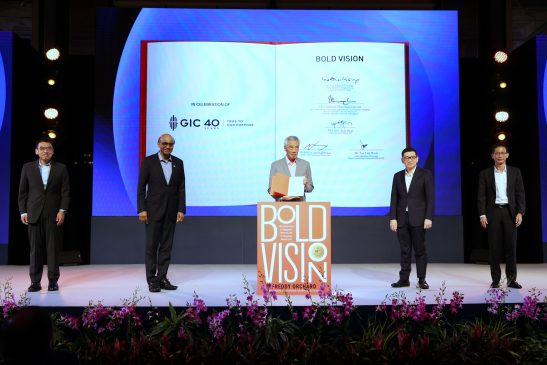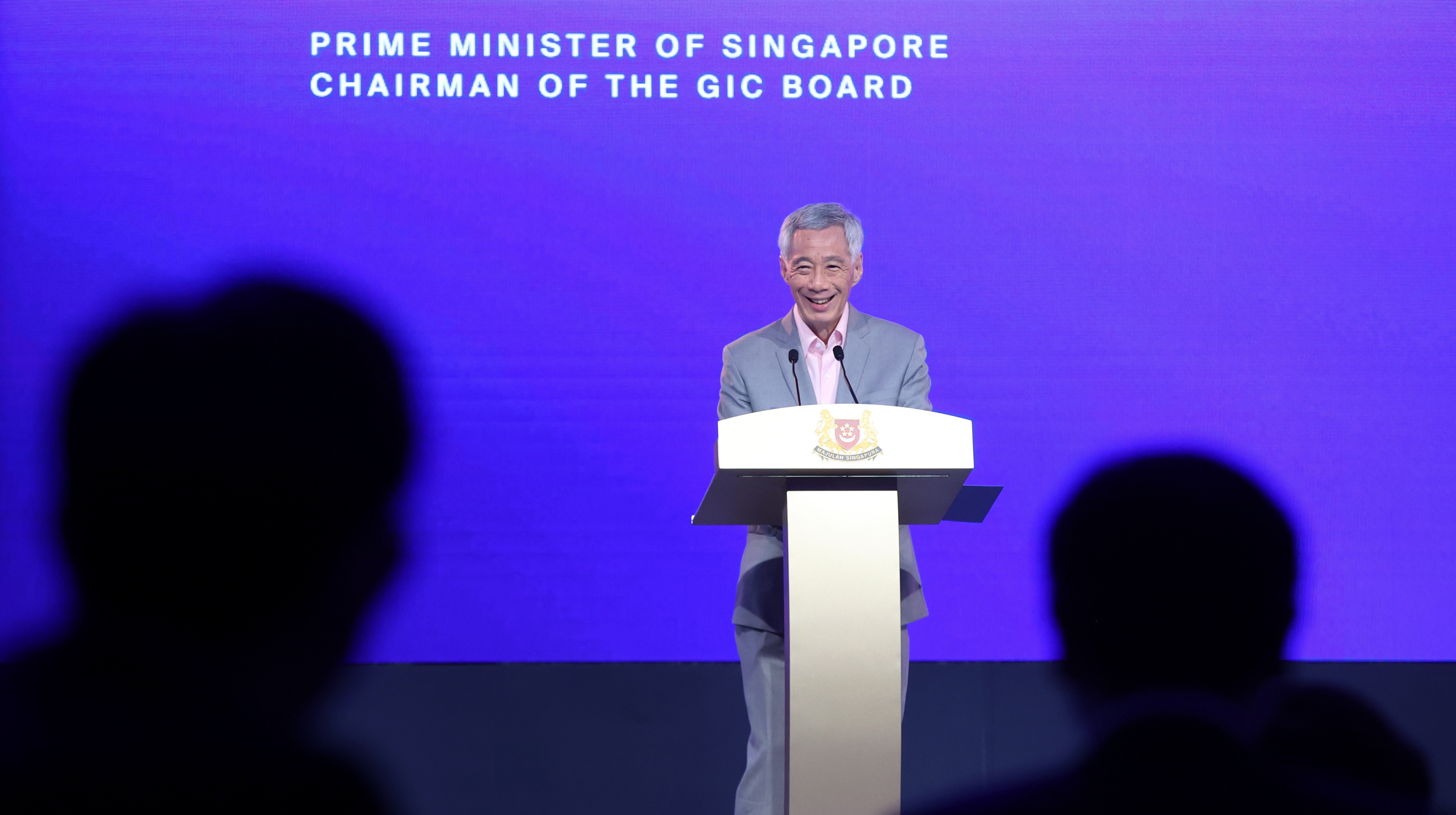Follow us on Telegram for the latest updates: https://t.me/mothershipsg
Prime Minister Lee Hsien Loong highlighted geopolitical tensions, climate change and economic uncertainties as the main external challenges facing Singapore's sovereign wealth fund GIC.
PM Lee, who is the chairman of GIC, was delivering a keynote address at GIC's 40th anniversary dinner held at the Shangri-La Singapore on Nov. 16.
Geopolitical tensions
PM Lee said that as GIC is invested in assets and markets all over the world, the value of the investments depends on functioning global financial markets, and that in turn requires the international system to hold together, and not split apart.
"Geopolitics will play a big role," PM Lee said.
He gave an example of the heightened United States-China tensions that are affecting global supply chains.
In his address, PM Lee said that countries are rethinking the downside of unfettered free flow of trade and investments, and putting new emphasis on supply chain security and resilience.
PM Lee noted that while the move is sensible, it can easily lead to "deep bifurcation of global trade and technology" if it becomes too excessive.
He also said that tensions and rivalry between the powers could cripple markets and investments, even short of full-on conflict.
As such, the virtual summit between US President Joe Biden and Chinese President Xi Jinping on Nov. 16 was "an encouraging early step" towards stabilising U.S.-China relations.
Climate change
Other than geopolitical tensions, climate change is another external challenge that GIC's portfolio is exposed to.
He said that in the medium term, the shift towards a greener and lower carbon economy will affect GIC's investment strategy, as the sovereign wealth fund will have to seek out new investment opportunities in green technologies, which are needed in the transition to a more sustainable world.
However, he said, in the longer term, if countries' efforts to decarbonise collectively prove inadequate, environmental deterioration and climate-related disasters will have severe consequences for the global economy, and thus GIC's portfolio.
"This is why GIC has developed its own sustainability framework and is watching the climate issue closely," he added.
Economic uncertainties
Another challenge is economic uncertainties, including the impact of prolonged low interest rates and record fiscal deficits.
"Everyone hopes that governments and central banks can unwind these actions without destabilising markets but nobody can be sure of this," PM Lee said.
At the same time, inflation, which has long been dormant globally, is stirring again, PM Lee added.
 Photo from Ministry of Communications and Information (MCI).
Photo from Ministry of Communications and Information (MCI).
Growing social spending
PM Lee also described that domestic conditions in Singapore "are evolving".
He highlighted that spending on social and healthcare will continue to grow, and there will be pressure on the government to draw more from Singapore's reserves instead of raising taxes to finance the higher spending.
"Every new generation of Singaporeans will ask themselves afresh the same question: do we maintain the same attitude as our forefathers?" PM Lee questioned.
He further asked whether Singaporeans can see themselves as "stewards of Singapore", with a responsibility for enduring its survival and success, and treat the reserves as a rainy-day fund, drawing prudently and sustainably from them for present needs.
"I hope they will reach the same conclusion as Singaporeans have done so far. Retain the formula that has worked so well for GIC, and for Singapore, now for more than half a century and thus perpetuate our prosperity and resilience for generations to come," PM Lee said.
Key factors for GIC's success
Amidst the future challenges, PM Lee also laid out the key factors that contributed to GIC's success, especially during three critical moments - the Asian Financial Crisis, the Global Financial Crisis and the Covid-19 pandemic.
Meritocratic principles
First, he said, GIC set out to create a first-class institution based on meritocratic principles, and succeeded in building one, focussed on a clear mission to manage our reserves professionally run by a top-notch GIC team.
"A strong Singaporean core of highly competent professionals, reinforced and complemented with talent from across the world, and with effective leadership at all levels to set the direction, and take GIC forward", he said.
Adapt responsively
PM Lee also said during his speech that GIC has adapted responsively to the changing financial landscape by expanding its geographical coverage as new market opportunities arose.
"In response to secular megatrends like technological disruption, GIC is also investing more in enterprise technology, innovative healthcare, digital services, and logistics," he said.
Systematic investment
He also highlighted that GIC has approached its investment mandates systematically, with ample thought and caution. However, he added that GIC also neither adopts a zero-risk mindset, nor does it chase maximum returns heedless of risk.
He noted that the government sets the risk parameters for GIC.
GIC then designs and manages a portfolio mix of different investment assets to achieve the best possible performance within these limits, he added.
"This is how GIC has delivered stable long-term returns, despite great uncertainty and changes in economic and financial conditions," PM Lee said.
Core values
Lastly, he said that GIC is anchored on its core values: Prudence, Respect, Integrity, Merit and Excellence.
"These are factors intrinsic to GIC. But just as important to GIC's success are the political and fiscal conditions within which the organisation operates, which enable GIC to function properly," he said.
Political and fiscal conditions
PM Lee highlighted that from day one, the government made it a point to shield GIC from political interference.
With clearly separated the roles of the Board and management, GIC entrusted the management team to make investment decisions objectively and professionally, free from political pressure.
"On its part, the political leadership stands by GIC and defends its ability to make investment decisions independently, so long as GIC has acted properly and competently," PM Lee said and added "even when the ex-post outcome turns out unfavourably."
He also noted that the government's prudent fiscal stance enables GIC to take a long-term view of investments.
PM Lee said that the Ministry of Finance, as owner of the funds that GIC invests, has always believed in spending within our means, and balancing the government budget in normal years.
"GIC knows that the government is committed to saving for the future, and will only draw down reserves only under exceptional circumstances," he said.
"GIC therefore can rely on the stability of the funds entrusted to it, and confidently invest these funds for the long term without having to worry that its funds will be withdrawn frequently and at short notice," PM Lee added.
This relationship has enabled GIC to build long-term partnerships, and take on calculated risks that only long-term investors can accept.
Follow and listen to our podcast here
Top image from Ministry of Communications and Information (MCI)
If you like what you read, follow us on Facebook, Instagram, Twitter and Telegram to get the latest updates.
